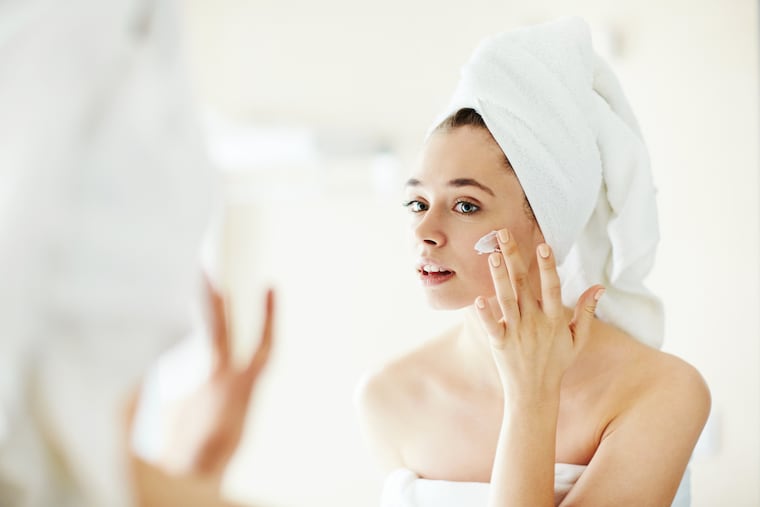Take it from dermatologist: Less is more in skin care
There’s little, if any, evidence to support most of the skincare solutions touted by social media influencers and celebrities today — CBD, apple cider vinegar, tea tree oil.

Every day, I see patients with intricately planned and elaborate skin-care regimens. They often unveil an assortment of tiny bottles in fancy packaging. They turn to me and ask, what more should I be doing?
I want to age gracefully, too — our skin is the most visible part of our body and represents our identities. But over time, the skin care industry has taken advantage of our collective anxiety about aging and convinced us that we should be doing more, when what we should be doing is less.
It sounds counterintuitive, how can less be more?
There were times many years ago when less was most definitely less. A century ago, infections were common because of lack of even primitive sanitation. Skin-care products in the early 20th century had little evidence to support their use, and the Food and Drug Administration had not yet been empowered to set appropriate standards, at least for medicines. I recommend reading Paul Offit’s book Do You Believe in Magic? to learn about how the vitamin and supplement industry is still under no legal obligation to prove any of its claims.
If you are concerned about skin aging, only a few things matter or work.
There’s little, if any, evidence to support most of the skin-care solutions touted by social media influencers and celebrities today — CBD, apple cider vinegar, tea tree oil. Even Vitamin C, which is recommended by some dermatologists to help with skin aging, is backed by limited medical research. Just because a product’s marketing has seemingly meaningful technical-sounding jargon (antioxidants, collagen, peptides) doesn’t mean it actually works.
We are better off spending our time and money on only the most scientifically proven products.
For instance, there is considerable evidence that sunscreen and topical retinoids are valuable skin-care products limiting the effects of sun damage and aging. In skin care, “less is more” means use only products that actually work. Everything else is a waste of money.
And it’s not just about money. When you use more products, even supposedly natural ones, there’s more exposure to potentially irritating or allergy-causing ingredients. During the early COVID-19 pandemic, many people staying home noticed that when they used less makeup and skin care, their skin improved. My friend and fellow dermatologist Ivy Lee called this “the power of the pause.”
Of course, beyond aging, if you have an actual medical disease of the skin, see a primary-care doctor or a dermatologist who can help you.
If you are concerned about skin aging, only a few things matter or work:
Genetics. At birth, 100% of your skin aging is due to genetics. By the time you are an older adult, aging is still at least 60% due to genetics, and much appears due to skin color. In general, the greater the melanin (and the darker the skin), the less that someone appears to age. If your beautiful friend is using a special product, that’s not why the effects of aging are not showing; it’s because of the person’s parents!
Environmental effects — sun exposure and smoking. If you want to avoid aging, don’t smoke any cigarettes or vape, and avoid intentional sun exposure — no laying out for a tan and no tanning beds.
Sunscreen. We dermatologists recommend at least SPF 30 sunscreen protection daily, year-round, because sun exposure is cumulative, even when the sun isn’t strong enough to cause a sunburn. What matters most is using something you like and will be consistent with (I prefer lotion rather than sprays, and both mineral and chemical ones are good), but you don’t have to spend a boatload. Consumer Reports found that its top-rated sunscreen, La Roche-Posay Anthelios, was marginally better than Walmart’s Equate, but at nearly 11 times the cost ($35.99 for 5 ounces vs. $5.35 for 8 ounces on Amazon). Personally, I wouldn’t spend that extra money. Most of us get by fine with a Toyota rather than a Ferrari, but it’s your money.
Topical vitamin A derivatives — the retinols over the counter, and much better, the stronger retinoids (over the counter adapalene — branded as Differin) and prescription tretinoin. Retinoids are the only agent with strong evidence that they reduce or slow aging and wrinkling.
It’s not the sexiest method, but I believe the simple approach works best. Trying things with little proof is tempting, but it costs us both money and mental burden with little to show for it. If people tell you otherwise, always check to see if they are selling something. Less is more in skin care.
Jules Lipoff (www.juleslipoff.com) is an adjunct clinical associate professor in the Department of Dermatology at the Lewis Katz School of Medicine, Temple University. He practices at Advanced Dermatology and Cosmetic Surgery, a private practice in Manayunk/Roxborough.